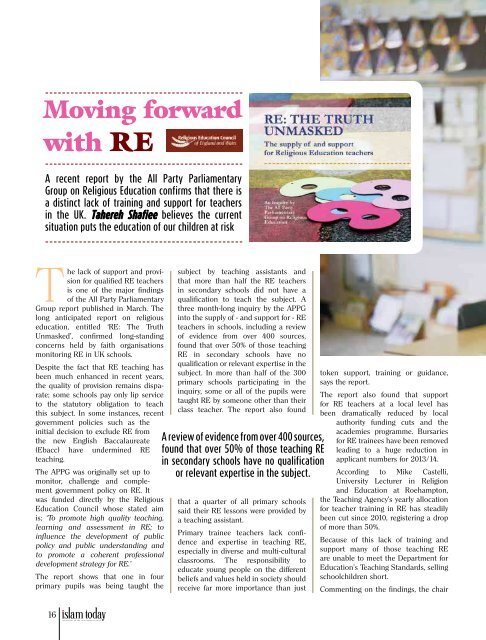You also want an ePaper? Increase the reach of your titles
YUMPU automatically turns print PDFs into web optimized ePapers that Google loves.
Moving forwardwith REA recent report by the All Party ParliamentaryGroup on Religious Education confirms that there isa distinct lack of training and support for teachersin the UK. Tahereh Shafiee believes the currentsituation puts the education of our children at riskThe lack of support and provisionfor qualified RE teachersis one of the major findingsof the All Party ParliamentaryGroup report published in March. Thelong anticipated report on religiouseducation, entitled ‘RE: The TruthUnmasked’, confirmed long-standingconcerns held by faith organisationsmonitoring RE in UK schools.Despite the fact that RE teaching hasbeen much enhanced in recent years,the quality of provision remains disparate;some schools pay only lip serviceto the statutory obligation to teachthis subject. In some instances, recentgovernment policies such as theinitial decision to exclude RE fromthe new English Baccalaureate(Ebacc) have undermined REteaching.The APPG was originally set up tomonitor, challenge and complementgovernment policy on RE. Itwas funded directly by the ReligiousEducation Council whose stated aimis; ‘To promote high quality teaching,learning and assessment in RE; toinfluence the development of publicpolicy and public understanding andto promote a coherent professionaldevelopment strategy for RE.’The report shows that one in fourprimary pupils was being taught thesubject by teaching assistants andthat more than half the RE teachersin secondary schools did not have aqualification to teach the subject. Athree month-long inquiry by the APPGinto the supply of - and support for - REteachers in schools, including a reviewof evidence from over 400 sources,found that over 50% of those teachingRE in secondary schools have noqualification or relevant expertise in thesubject. In more than half of the 300primary schools participating in theinquiry, some or all of the pupils weretaught RE by someone other than theirclass teacher. The report also foundA review of evidence from over 400 sources,found that over 50% of those teaching REin secondary schools have no qualificationor relevant expertise in the subject.that a quarter of all primary schoolssaid their RE lessons were provided bya teaching assistant.Primary trainee teachers lack confidenceand expertise in teaching RE,especially in diverse and multi-culturalclassrooms. The responsibility toeducate young people on the differentbeliefs and values held in society shouldreceive far more importance than justtoken support, training or guidance,says the report.The report also found that supportfor RE teachers at a local level hasbeen dramatically reduced by localauthority funding cuts and theacademies programme. Bursariesfor RE trainees have been removedleading to a huge reduction inapplicant numbers for 2013/14.According to Mike Castelli,University Lecturer in Religionand Education at Roehampton,the Teaching Agency’s yearly allocationfor teacher training in RE has steadilybeen cut since 2010, registering a dropof more than 50%.Because of this lack of training andsupport many of those teaching REare unable to meet the Department forEducation’s Teaching Standards, sellingschoolchildren short.Commenting on the findings, the chairof the APPG on RE, Stephen LloydMP said: “There are a large numberof excellent RE teachers across thecountry who are doing a first-class jobpreparing children for the challengeslife throws at them, and helping themmake sense of the wide range of beliefsand cultures around us. But a range ofpolicies, most notably those relatingto the EBacc, academies and GCSEshort courses, have served to lowerRE’s status on the curriculum….asmany children as possible should beencouraged to study GCSE ReligiousStudies - and it is essential that theyare taught by experienced and trainedprofessionals at primary and secondarylevel.”RE is compulsory in all maintainedschools, but not as part of the NationalCurriculum. Uniquely, the RE syllabusis determined locally by committees(SACREs), often dominated byreligious interests. Many faith schoolsare also permitted to teach RE froma confessional viewpoint. The inquiryfound that the situation has beencompounded by insufficient professionaldevelopment opportunities forsubject leaders, specialist teachers andthose who take on the responsibility forteaching RE. Evidence also revealeda wide variation in the amount andquality of initial teacher training for REwith many trainee teachers stating theyhad little effective preparation to teachthe subject.In these circumstances it is illogical toexpect the emergence of a generationof young people who understand andare sensitive to the growing levels ofreligious diversity in our multifaithsociety.The Rev Jan Ainsworth, the Church ofEngland’s Chief Education Officer, said:“This [report] provides strong evidencefor our continuing concern that REis being downgraded as part of thecurriculum.Islamic organisations’ concerns aboutthe state of religious education in theUK are dominated by the need for arigorous and academically challengingapproach to the subject in every schoolincluding free schools and academies.The APPG’s report included clearrecommendations for primary andsecondary schools, teacher trainingproviders, local authorities, Ofsted, andalso for those providing professionaldevelopment for teachers, and theDepartment for Education.Armed with this new evidence religiousorganisations and promoters of RE inschools need to ensure that pressureis now applied on the governmentto secure funds for training of futureRE teachers and the development ofteaching materials. •1617


